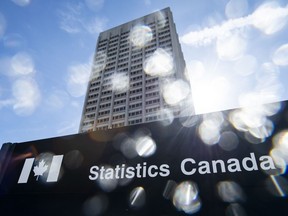Statistics Canada releases GDP flash estimate for February showing growth flatlined
Article content
Canada’s economy expanded by 0.4 per cent in January from the month before, beating analysts’ estimates and setting the stage for quarterly annualized growth to hit the Bank of Canada’s target of two per cent.
Article content
Article content
But Statistics Canada‘s flash gross domestic product (GDP) estimate for February is flat, a possible sign of things to come as United States President Donald Trump’s trade war continues to dent consumer and business confidence.
Advertisement 2
Article content
Here’s what economists are saying about the latest GDP numbers and what they mean for the Bank of Canada and interest rates.
Balancing act: Alberta Central
The Canadian economy entered the new year on a “strong footing,” but that doesn’t really matter now, Charles St-Arnaud, chief economist at credit union Alberta Central, said.
“Overall, the strength in the economy at the start of the year does not alter the Bank of Canada’s view that it will need to balance the deflationary impact of the tariffs against the inflationary pressures arising from higher costs resulting from the tariffs,” he said in a note on Friday.
For the moment, he is expecting policymakers to hold interest rates at their next policy meeting on April 16 unless something materially changes on the tariff front.
Article content
Advertisement 3
Article content
Based on the “extreme uncertainty” created by Trump’s tariff gyrations in February and March, St-Arnaud thinks the economy is headed for contraction in the second quarter.
‘Artificial boost’: Oxford Economics
January’s strong GDP result was the result of an “artificial boost,” with companies pushing more exports to the U.S. to beat tariffs and the GST/HST tax break supporting demand, Michael Davenport, senior economist at Oxford Economics Canada.
He said it’s only downhill from here for growth.
“January may represent the peak in economic activity as the U.S.-Canada trade war pushes Canada’s economy into a recession beginning in Q2,” Davenport said in a note.
He doesn’t think the Bank of Canada will put too much stock in the backward-looking GDP data, and he said policymakers will likely hold interest rates at the next meeting “to balance the negative hit to demand from tariffs against the upside risks to inflation.”
Advertisement 4
Article content
‘Losing momentum’: Capital Economics
The poor flash GDP estimate for February can’t be fully laid at the door of Trump’s tariff threat, Thomas Ryan, North America economist at Capital Economics Ltd., said.
“Nonetheless, it adds to the sense the economy is losing momentum,” he said in a note.
Slumping business and consumer confidence also appear to be front-running the growing anxiety regarding tariffs and the harm they could inflict.
“However, we are still yet to see the full impact of the emerging trade war with the U.S. on the hard data, which we expect to push the economy into a mild recession by mid-year,” he said.
‘Backward data’: Royal Bank of Canada
“Better-looking backward data is less relevant given escalating trade risks and plunging consumer confidence into March,” Nathan Janzen, assistant chief economist at Royal Bank of Canada, said in a note.
Advertisement 5
Article content
He said most hard economic data has yet to reflect the drop-off in consumer confidence that was recorded in March by the Bank of Canada in a report it released alongside its last interest rate decision.
RBC’s tracking of credit-card transactions has yet to show a decline in spending up to mid-March, and job openings are better than they were at this time last year, Janzen said.
Recommended from Editorial
January was the first time GDP per capita rose over two straight months in two-and-a-half years. Previously, it contracted over several quarters as the economy failed to keep pace with the increase in population.
“But international trade risks continue to cloud the outlook, with the details behind another round of expected tariff announcements next week (having) the potential to significantly impact the Canadian economic growth outlook,” he said.
• Email: gmvsuhanic@postmedia.com
Bookmark our website and support our journalism: Don’t miss the business news you need to know — add financialpost.com to your bookmarks and sign up for our newsletters here.
Article content
Canada’s slumping growth hints at second quarter recession
2025-03-28 15:35:58




